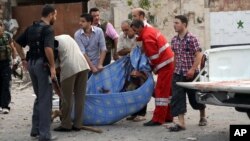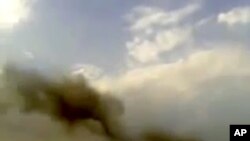Four coordinated explosions on Wednesday ripped through a government-controlled section of Syria's largest city, Aleppo, killing dozens of people and wounding nearly 100 others. The blasts gutted a military officers' club and a nearby hotel.
Opposition groups say at least 48 people died, mostly from the security services, while Syrian state media put the death toll at 31.
Meanwhile, a mortar shell fired from Syria hit the southeastern Turkish border town of Akcakale. Turkish media say five people, including a mother and her three children, were killed when the shell landed in a residential area. At least nine others were seriously wounded.
Turkish Foreign Minister Ahmet Davutoglu phoned U.N. Secretary-General Ban Ki-moon to brief him about the developments in Akcakale.
Opposition groups say at least 48 people died, mostly from the security services, while Syrian state media put the death toll at 31.
Meanwhile, a mortar shell fired from Syria hit the southeastern Turkish border town of Akcakale. Turkish media say five people, including a mother and her three children, were killed when the shell landed in a residential area. At least nine others were seriously wounded.
Turkish Foreign Minister Ahmet Davutoglu phoned U.N. Secretary-General Ban Ki-moon to brief him about the developments in Akcakale.
Aleppo bombings
Earlier in Aleppo, Syrian government forces fired into the air after the blasts as plumes of black smoke rose over the city's usually bustling Saadallah al-Jabri Square. Government-run television showed a large crater where it said one of three car bombs went off.
Clusters of young men picked through the rubble. Chunks of concrete, glass and twisted metal were thrown onto the pavement. Bulldozers worked to clear the debris.
Rami Abd al-Rahman of the opposition Syrian Observatory for Human Rights, says that the string of car bombs targeted government forces. He said violence by the government is provoking counter-violence by the rebels.
Syrian government media blamed what they called “terrorists” for the blasts. Parliament Speaker Mohammed Jihad Laham said that Syria's cultural and economic infrastructure is being destroyed.
Laham said that Aleppo, the capital of Islamic culture and of manufacturing, has fallen victim to an odious crime and disgusting terrorist explosions that have struck innocent people.
'Destructive confrontation'
Analyst Peter Harling of the International Crisis Group says that both sides have been engaged in what he calls an “extremely destructive confrontation” in recent weeks, but without making any “tangible gains.”
Harling does, however, see a glimmer of hope, as some reports indicate possible talks between the government and opposition factions.
“We're in a phase of confusion and reconfiguration with some willingness among the more pragmatic players to see whether a return to politics is possible, although they're not quite sure how to go about it,” he said.
The joint United Nations-Arab League envoy for Syria, Lakhdar Brahimi, is set to return to the region next week as he tries to revive efforts to end the 18-month conflict.
Heavy government shelling was also reported in the region of Homs, the outer suburbs of Damascus, parts of Deraa, and Deir Ezzor.
Refugees suffering
Inside Syria, VOA's Scott Bobb traveled on Wednesday to the Bab al-Salama camp for internally displaced persons, located a few kilometers from the Turkish town of Killis. He said about 6,000 Syrians have fled to the camp in the last month.
"This upsurge occurred about a month ago when the bombing intensified by the Syrian air force on basically defenseless towns and civilians in northern Syria," he said. "People [were] just panicked and traumatized and decided to get out."
Bobb said the mostly Sunni civilians initially fled to Turkey, but large numbers are now forced to wait at Bab al-Salama until space becomes available in the Turkish refugee camps.
As Turkish officials let in hundreds of people each day, more arrive from deeper inside Syria, Bobb said.
"So it's a constant influx of hundreds, maybe up to a thousand a day at this one point," he said. "Multiply that by half a dozen or more crossing points in northern Syria and you can see why the United Nations is calling it a major catastrophe in waiting."
Earlier in Aleppo, Syrian government forces fired into the air after the blasts as plumes of black smoke rose over the city's usually bustling Saadallah al-Jabri Square. Government-run television showed a large crater where it said one of three car bombs went off.
Clusters of young men picked through the rubble. Chunks of concrete, glass and twisted metal were thrown onto the pavement. Bulldozers worked to clear the debris.
Rami Abd al-Rahman of the opposition Syrian Observatory for Human Rights, says that the string of car bombs targeted government forces. He said violence by the government is provoking counter-violence by the rebels.
Syrian government media blamed what they called “terrorists” for the blasts. Parliament Speaker Mohammed Jihad Laham said that Syria's cultural and economic infrastructure is being destroyed.
Laham said that Aleppo, the capital of Islamic culture and of manufacturing, has fallen victim to an odious crime and disgusting terrorist explosions that have struck innocent people.
Some of the deadliest bombings in Syria
Some of Syria's deadliest bombings- December 2011: Suicide bombings kill 44 people outside a Damascus intelligence compound
- January 2012: A suicide blast kills 25 people, many of them police, at a Damascus intersection
- February 2012: Twin explosions in Aleppo kill 28 people
- March 2012: Car bombs kill 27 people near intelligence and security buildings in Damascus
- May 2012: Twin bombings in Damascus kill 55 people
- October 2012: Car bombs in Aleppo kill at least 40 people
Analyst Peter Harling of the International Crisis Group says that both sides have been engaged in what he calls an “extremely destructive confrontation” in recent weeks, but without making any “tangible gains.”
Harling does, however, see a glimmer of hope, as some reports indicate possible talks between the government and opposition factions.
“We're in a phase of confusion and reconfiguration with some willingness among the more pragmatic players to see whether a return to politics is possible, although they're not quite sure how to go about it,” he said.
The joint United Nations-Arab League envoy for Syria, Lakhdar Brahimi, is set to return to the region next week as he tries to revive efforts to end the 18-month conflict.
Heavy government shelling was also reported in the region of Homs, the outer suburbs of Damascus, parts of Deraa, and Deir Ezzor.
Refugees suffering
Inside Syria, VOA's Scott Bobb traveled on Wednesday to the Bab al-Salama camp for internally displaced persons, located a few kilometers from the Turkish town of Killis. He said about 6,000 Syrians have fled to the camp in the last month.
"This upsurge occurred about a month ago when the bombing intensified by the Syrian air force on basically defenseless towns and civilians in northern Syria," he said. "People [were] just panicked and traumatized and decided to get out."
Bobb said the mostly Sunni civilians initially fled to Turkey, but large numbers are now forced to wait at Bab al-Salama until space becomes available in the Turkish refugee camps.
As Turkish officials let in hundreds of people each day, more arrive from deeper inside Syria, Bobb said.
"So it's a constant influx of hundreds, maybe up to a thousand a day at this one point," he said. "Multiply that by half a dozen or more crossing points in northern Syria and you can see why the United Nations is calling it a major catastrophe in waiting."













